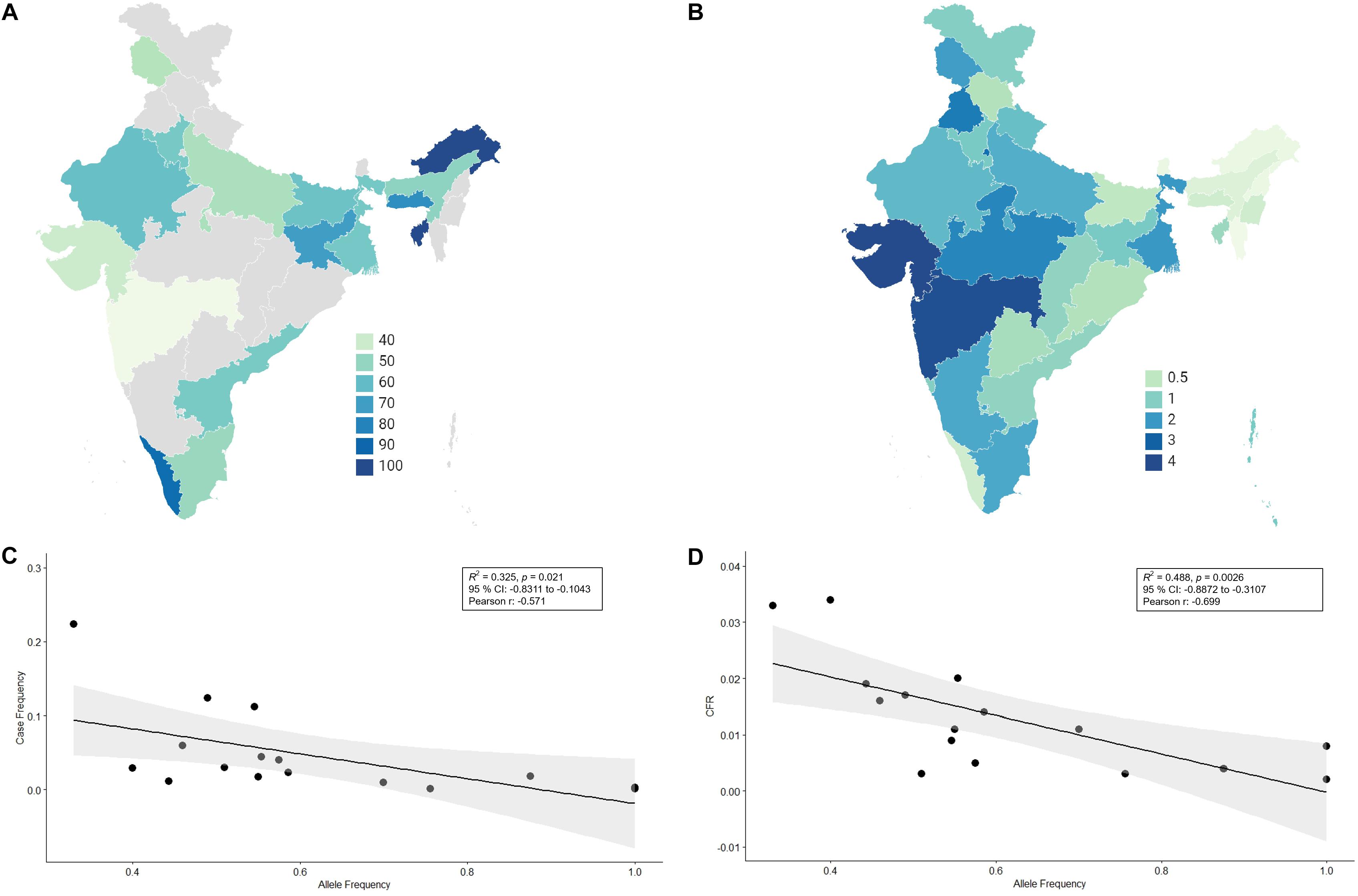ACE2
is a cell receptor that mediates the infection of lung tissue by coronaviruses,
either the one that causes COVID-19 or others that cause the common cold. The ACE2
gene has 1,700 alleles, some of which are associated with increased
susceptibility to coronavirus infection (Frost 2020).
This
difference in susceptibility has been shown in a recent Indian study (Srivastava
et al. 2020). COVID-19 is most fatal in the western states of Gujarat,
Maharashtra, Madhya Pradesh, and Punjab. Conversely, it is least fatal in the
northeast states of Assam, Arunachal Pradesh, and Nagaland. This pattern
closely correlates with genetic variation at the rs2285666 locus of ACE2. The
presence or absence of a single allele explains 35% of the variation in the COVID-19
case-fatality rate.
The
authors conclude that some kind of selection has been acting on rs2285666. If
we look at the map, susceptibility to COVID-19 seems to be strongest in those
regions with the longest history of sedentary living and large urban centers.
Conversely, it seems to be weakest in the Northeast, which is home to people
who, until recent times, belonged to small communities that routinely moved
from one cultivable area to another.
These
findings are consistent with the hypothesis that the ACE2 receptor has
coevolved with human environments. Because respiratory viruses boost the immune
response of lung tissue and thereby prevent more serious pulmonary diseases
(e.g., tuberculosis, pneumonia, pneumonic plague), some human populations may
have gained protection from severe respiratory infections by becoming more
susceptible to mild respiratory infections, such as those normally caused by
coronaviruses. This commensal relationship would have been especially adaptive
where respiratory pathogens could easily propagate, that is, in crowded
environments where many people live in proximity not only to each other but also
to livestock. In regions that have long had crowded environments, natural
selection may have favored susceptibility to infection by coronaviruses, which
are normally mild in their effects, as a means to maintain a strong immune
response to deadly pulmonary diseases (Frost 2020).
****************************************************
I'm
sorry for the break in my posting. When the pandemic first struck, I expected
to have a lot of time on my hands, so I began a series of writing projects:
four articles and a manuscript for a book. Unfortunately, my free time dried up
over the summer, and my workload became overwhelming. I hope I've now found the
right balance between my writing projects and my regular work.
References
Frost,
P. (2020). Does a commensal relationship exist between coronaviruses and some
human populations? Journal of Molecular
Genetics 3(2): 1-2.
Srivastava,
A., A. Bandopadhyay, D. Das, R.K. Pandey, V. Singh, N. Khanam, N. Srivastava,
P.P. Singh, P.K. Dubey, A. Pathak, P. Gupta, N. Rai, G.N.N. Sultana, and G.
Chaubey. (2020). Genetic Association of ACE2 rs2285666 Polymorphism with
COVID-19 Spatial Distribution in India. Frontiers
in Genetics. September 25
https://doi.org/10.3389/fgene.2020.564741

Great to see you back, Peter. I have been describing your theory to people (to the best of my layman’s ability).
ReplyDeleteSome commentators thought that the Chines may have a particular susceptibility to Covid.
ReplyDeleteThat is not the case. where where they wrong?
hi Peter, I just tested your link to your website and I failed to get it.
ReplyDeleteI have read that the Indian slum people are not getting Covid 19 but middle class Indian people who live in far more hygienic and spacious surrounding are being hard hit.
ReplyDeleteMaybe because they already have a high death rate, Africa seems to have had surprisingly few deaths from Covid 19, but then China has too. Totalitarian state; yes, but China suffered relatively little during the 1918 pandemic.
I think this is Ancient history (Antonine Plague) repeating itself. India and China are a source of pandemics that the West is disproportionately impacted by.
The West has got too interconnected, like the proto-cities in Neolithic Europe:-
https://www.nature.com/articles/d41586-018-07673-7
"Rasmussen’s team suggests that plague first emerged in European mega-settlements — “the textbook example of where pathogens evolve”, he says — and then spread eventually to Sweden through trade networks, and not the migration of people with steppe ancestry.
“The earliest forms of plague spread before the steppe migrations and probably killed off a good chunk of Neolithic populations,” says Kristian Kristiansen, an archaeologist at the University of Gothenburg in Sweden and a co-author of the study. He predicts that burials from mega-settlements will harbour even more evolutionarily ancient strains of plague.
[T]he hypothesis that plague emerged in mega-settlements is reasonable, given their unprecedented population density, but is not proven until plague DNA is actually found."
Your two maps show a negative correlation, at least on the prominent regions that I inspected. I think your results would have been more striking had you plotted the negative of either one of them.
ReplyDeleteBruce,
ReplyDeleteThanks!
John Taylor,
Please elaborate. I know that Chinese Americans have an incidence comparable to White Americans, but that may mean they are more diligent in avoidance behavior (distancing, washing hands, etc.)
Jon Claerbout,
I'll look into it ...
Sean,
Africa probably has a low incidence because of the high temperature and high humidity. But is the fatality rate per infection lower?
Jon Claerbout,
The correlation is negative if you choose the "alternate" allele. But the term "alternate" is relative. There are at least two alleles in India, and one of them is correlated with the fatality rate for COVID-19.
It would be more interesting to know which allele is "derived."
Peter, this article suggests susceptibility related to Neanderthal ancestry.
ReplyDeletehttps://www.sciencefocus.com/news/neanderthal-genes-could-increase-the-severity-of-covid-19-symptoms/